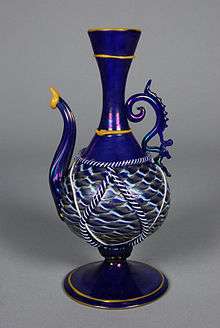Salviati (glassmakers)
A family called Salviati were glass makers and mosaicists in Murano, Venice and also in London, working as the firm Salviati, Jesurum & Co. of 213 Regent Street, London; also as Salviati and Co. and later (after 1866) as the Venice and Murano Glass and Mosaic Company (Today Pauly & C. - Compagnia Venezia Murano). In 1898 the company's new London premises at 235 Regent Street (now the Apple Store) incorporated a set of mosaic armorials along the façade which are still visible today and were restored in 1999.

The company was founded by Dr Antonio Salviati, a lawyer from Vicenza in Northern Italy.
Many famous mosaics were made by Salviati and the company's various historical name changes are well documented[1]
- the Central Lobby of the House of Parliament (Palace of Westminster), London
- the Paris Opera House
- the Albert Memorial
- Westminster's Altar Screen
- Westminster Cathedral
- the Council House, Birmingham
- the Chamberlain Memorial, Birmingham.
- St David's Cathedral in Wales.
- St Paul's Cathedral, London
- Ajuda National Palace,[2] Lisbon.
The company was later acquired in 1999 by the French glassmaker that would later be known as Arc International.
In World War II, the Salviati building on the Grand Canal in Venice was occupied by the Nazis and used as a Nazi Headquarters. The Camerino family fled the Holocaust to various locations throughout the world including the UK, USA, Israel, and South Africa.
References
- "The Salviati Architectural Mosaic Database: About". salviatimosaics.blogspot.com. Retrieved 2016-04-17.
- "Palácio Nacional da Ajuda - The National Palace of Ajuda - Taça". www.palacioajuda.pt. Retrieved 8 August 2017.
External links
| Wikimedia Commons has media related to Salviati & Co.. |
- The mosaics above the high altar in St David's Cathedral, Wales
- Detail from the above – St David's Cathedral
- Mosaic arms of Venice on the outside of the Apple Store, Regent Street, London
- Salviati
- Official Site of Pauly & C. | CVM – Compagnia Venezia Murano